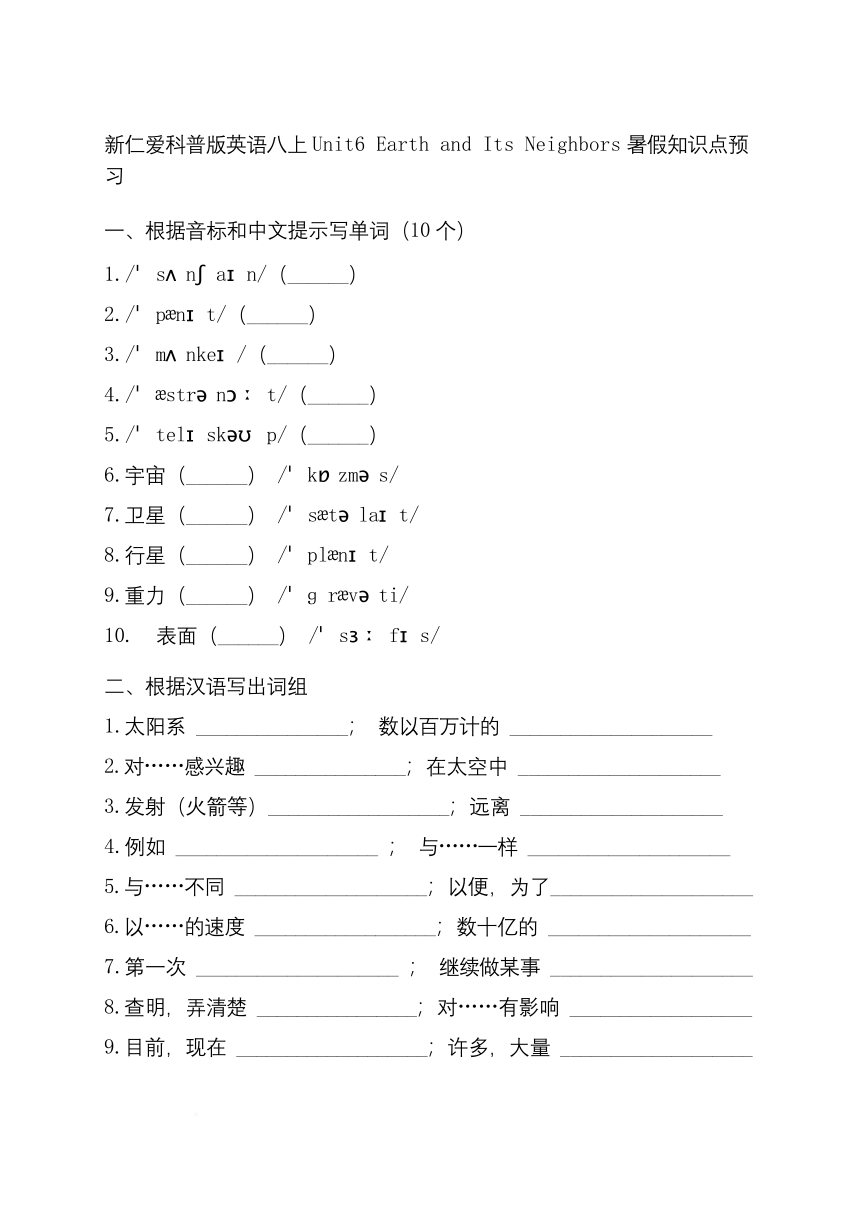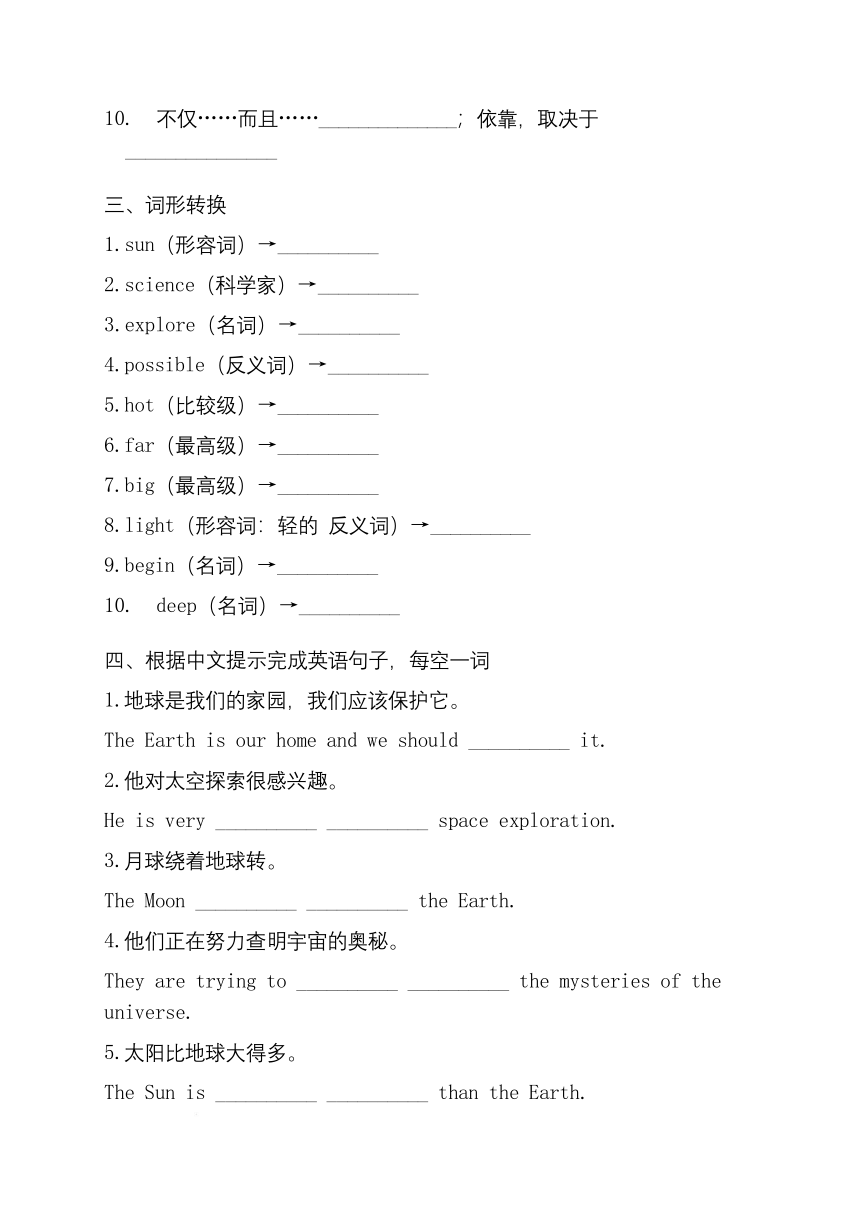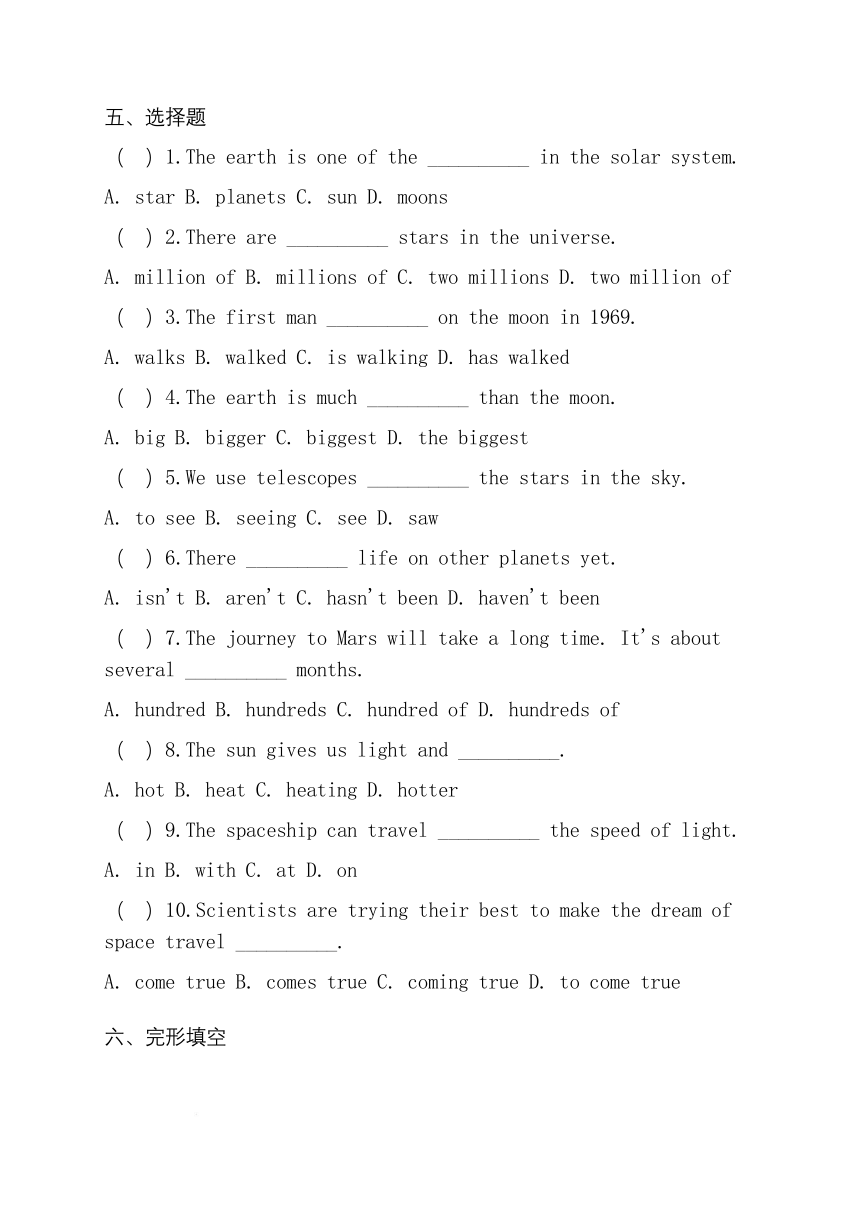Unit6 Earth and Its Neighbors 暑假知识点预习(含答案)仁爱科普版(2024)英语八年级上册
文档属性
| 名称 | Unit6 Earth and Its Neighbors 暑假知识点预习(含答案)仁爱科普版(2024)英语八年级上册 |  | |
| 格式 | docx | ||
| 文件大小 | 2.9MB | ||
| 资源类型 | 教案 | ||
| 版本资源 | 仁爱科普版 | ||
| 科目 | 英语 | ||
| 更新时间 | 2025-07-07 13:54:21 | ||
图片预览




文档简介
新仁爱科普版英语八上 Unit6 Earth and Its Neighbors 暑假知识点预
习
一、根据音标和中文提示写单词(10 个)
1./ s n a n/(______)
2./ p n t/(______)
3./ m nke /(______)
4./ str n t/(______)
5./ tel sk p/(______)
6.宇宙(______) / k zm s/
7.卫星(______) / s t la t/
8.行星(______) / pl n t/
9.重力(______) / ɡ r v ti/
10. 表面(______) / s f s/
二、根据汉语写出词组
1.太阳系 _______________; 数以百万计的 ____________________
2.对……感兴趣 _______________;在太空中 ____________________
3.发射(火箭等)__________________;远离 ____________________
4.例如 ____________________ ; 与……一样 ____________________
5.与……不同 ___________________;以便,为了____________________
6.以……的速度 __________________;数十亿的 ____________________
7.第一次 ____________________ ; 继续做某事 ____________________
8.查明,弄清楚 ________________;对……有影响 __________________
9.目前,现在 ___________________;许多,大量 ___________________
10. 不仅……而且……______________;依靠,取决于
_______________
三、词形转换
1.sun(形容词)→__________
2.science(科学家)→__________
3.explore(名词)→__________
4.possible(反义词)→__________
5.hot(比较级)→__________
6.far(最高级)→__________
7.big(最高级)→__________
8.light(形容词:轻的 反义词)→__________
9.begin(名词)→__________
10. deep(名词)→__________
四、根据中文提示完成英语句子,每空一词
1.地球是我们的家园,我们应该保护它。
The Earth is our home and we should __________ it.
2.他对太空探索很感兴趣。
He is very __________ __________ space exploration.
3.月球绕着地球转。
The Moon __________ __________ the Earth.
4.他们正在努力查明宇宙的奥秘。
They are trying to __________ __________ the mysteries of the
universe.
5.太阳比地球大得多。
The Sun is __________ __________ than the Earth.
五、选择题
( )1.The earth is one of the __________ in the solar system.
A. star B. planets C. sun D. moons
( )2.There are __________ stars in the universe.
A. million of B. millions of C. two millions D. two million of
( )3.The first man __________ on the moon in 1969.
A. walks B. walked C. is walking D. has walked
( )4.The earth is much __________ than the moon.
A. big B. bigger C. biggest D. the biggest
( )5.We use telescopes __________ the stars in the sky.
A. to see B. seeing C. see D. saw
( )6.There __________ life on other planets yet.
A. isn't B. aren't C. hasn't been D. haven't been
( )7.The journey to Mars will take a long time. It's about
several __________ months.
A. hundred B. hundreds C. hundred of D. hundreds of
( )8.The sun gives us light and __________.
A. hot B. heat C. heating D. hotter
( )9.The spaceship can travel __________ the speed of light.
A. in B. with C. at D. on
( )10.Scientists are trying their best to make the dream of
space travel __________.
A. come true B. comes true C. coming true D. to come true
六、完形填空
通读下面短文,掌握其大意,然后从所给的 A、B、C、D 四个选项中选出
一个可以填入短文空白处的最佳选项。
The universe is a large and amazing place. Scientists are always
1 to learn more about it. The solar system is 2 of the
universe. It 3 the sun and eight planets. The earth is the
third planet 4 the sun. It is a beautiful planet with 5 and
water.
Scientists have sent 6 into space to explore other planets.
They have found many interesting things. For example, they have
found that Mars has seasons 7 the earth. But there are also
many differences. Mars is much 8 than the earth and has a very
thin 9 .
People have always dreamed of traveling to other planets.
Although it is very difficult, scientists believe that it may be
10 in the future.
1.A. trying B. try C. tries D. to try
2.A. some B. any C. part D. lot
3.A. includes B. including C. include D. included
4.A. from B. to C. at D. in
5.A. land B. lands C. a land D. the land
6.A. spaceships B. ships C. planes D. trains
7.A. as B. like C. for D. with
8.A. cold B. colder C. coldest D. the coldest
9.A. air B. airs C. an air D. the air
10. A. possibly B. possible C. impossibly D. impossible
七、阅读理解
(一)判断正误,正确的写 “T”,错误的写 “F”
The solar system is made up of the sun and all the objects that
travel around it. The planets are the largest objects in the
solar system after the sun. There are eight planets in the solar
system: Mercury, Venus, Earth, Mars, Jupiter, Saturn, Uranus,
and Neptune. Each planet has its own orbit around the sun.
The sun is a star. It is very hot and gives out light and heat.
Without the sun, there would be no life on Earth. The planets
get their light and heat from the sun.
Some planets have moons. The moon is a natural satellite of the
Earth. It goes around the Earth. Jupiter has the most moons in
the solar system.
( ) 1. The solar system only includes the sun.
( ) 2. There are nine planets in the solar system.
( ) 3. The sun gives light and heat to the planets.
( ) 4. Each planet has the same orbit around the sun.
( ) 5. Jupiter has the most moons in the solar system.
(二)阅读理解选择题
In the past, people could only see the moon and some bright
planets with their eyes. They knew little about space. But now,
with the development of science and technology, we can learn
more about space.
Scientists use telescopes to watch the stars and planets. They
can see things that are very far away. They have found that
there are many galaxies in the universe. A galaxy is a large
group of stars, gas, and dust. Our solar system is in the Milky
Way galaxy.
Spaceships have also helped us a lot. They can carry astronauts
into space. Astronauts can do experiments in space and bring
back important information. Scientists have sent spaceships to
other planets, like Mars. They want to find out if there is life
on other planets.
( )1.In the past, people knew ______ about space.
A. a lot B. little C. much D. everything
( )2.Scientists use ______ to watch the stars and planets.
A. eyes B. microscopes C. telescopes D. cameras
( )3.A galaxy is a large group of ______.
A. stars, gas, and dust B. planets C. moons D. spaceships
( )4.Our solar system is in the ______ galaxy.
A. Andromeda B. Whirlpool C. Milky Way D. Large Magellanic Cloud
( )5.Scientists have sent spaceships to Mars to ______.
A. take photos B. find water
C. find out if there is life D. bring back rocks
答案
一、根据音标和中文提示写单词
1.sunshine 2. planet 3. monkey 4. astronaut 5. telescope
6. cosmos 7. satellite 8. planet 9. gravity 10. surface
二、根据汉语写出词组
1.the solar system;millions of
2.be interested in;in space
3.send up;far away from
4.for example/such as;the same as
5.be different from;so that/in order to
6.at the speed of;billions of
7.for the first time;go on doing sth.
8.find out;have an effect on
9.at present;a large number of/plenty of
10. not only...but also...;depend on
三、词形转换
1.sunny 2. scientist 3. exploration 4. impossible 5. hotter
6. farthest/furthest 7. biggest 8. heavy 9. beginning 10. depth
四、根据中文提示完成英语句子,每空一词
1.protect 2. interested in 3. goes around 4. find out
5. much bigger
五、选择题
1 - 5 BBBBA 6 - 10 CABCA
六、完形填空
1 - 5 ACA AA 6 - 10 ABBAB
七、阅读理解
(一)判断正误
1 - 5 FFTFT
(二)阅读理解选择题
1 - 5 BCACC
习
一、根据音标和中文提示写单词(10 个)
1./ s n a n/(______)
2./ p n t/(______)
3./ m nke /(______)
4./ str n t/(______)
5./ tel sk p/(______)
6.宇宙(______) / k zm s/
7.卫星(______) / s t la t/
8.行星(______) / pl n t/
9.重力(______) / ɡ r v ti/
10. 表面(______) / s f s/
二、根据汉语写出词组
1.太阳系 _______________; 数以百万计的 ____________________
2.对……感兴趣 _______________;在太空中 ____________________
3.发射(火箭等)__________________;远离 ____________________
4.例如 ____________________ ; 与……一样 ____________________
5.与……不同 ___________________;以便,为了____________________
6.以……的速度 __________________;数十亿的 ____________________
7.第一次 ____________________ ; 继续做某事 ____________________
8.查明,弄清楚 ________________;对……有影响 __________________
9.目前,现在 ___________________;许多,大量 ___________________
10. 不仅……而且……______________;依靠,取决于
_______________
三、词形转换
1.sun(形容词)→__________
2.science(科学家)→__________
3.explore(名词)→__________
4.possible(反义词)→__________
5.hot(比较级)→__________
6.far(最高级)→__________
7.big(最高级)→__________
8.light(形容词:轻的 反义词)→__________
9.begin(名词)→__________
10. deep(名词)→__________
四、根据中文提示完成英语句子,每空一词
1.地球是我们的家园,我们应该保护它。
The Earth is our home and we should __________ it.
2.他对太空探索很感兴趣。
He is very __________ __________ space exploration.
3.月球绕着地球转。
The Moon __________ __________ the Earth.
4.他们正在努力查明宇宙的奥秘。
They are trying to __________ __________ the mysteries of the
universe.
5.太阳比地球大得多。
The Sun is __________ __________ than the Earth.
五、选择题
( )1.The earth is one of the __________ in the solar system.
A. star B. planets C. sun D. moons
( )2.There are __________ stars in the universe.
A. million of B. millions of C. two millions D. two million of
( )3.The first man __________ on the moon in 1969.
A. walks B. walked C. is walking D. has walked
( )4.The earth is much __________ than the moon.
A. big B. bigger C. biggest D. the biggest
( )5.We use telescopes __________ the stars in the sky.
A. to see B. seeing C. see D. saw
( )6.There __________ life on other planets yet.
A. isn't B. aren't C. hasn't been D. haven't been
( )7.The journey to Mars will take a long time. It's about
several __________ months.
A. hundred B. hundreds C. hundred of D. hundreds of
( )8.The sun gives us light and __________.
A. hot B. heat C. heating D. hotter
( )9.The spaceship can travel __________ the speed of light.
A. in B. with C. at D. on
( )10.Scientists are trying their best to make the dream of
space travel __________.
A. come true B. comes true C. coming true D. to come true
六、完形填空
通读下面短文,掌握其大意,然后从所给的 A、B、C、D 四个选项中选出
一个可以填入短文空白处的最佳选项。
The universe is a large and amazing place. Scientists are always
1 to learn more about it. The solar system is 2 of the
universe. It 3 the sun and eight planets. The earth is the
third planet 4 the sun. It is a beautiful planet with 5 and
water.
Scientists have sent 6 into space to explore other planets.
They have found many interesting things. For example, they have
found that Mars has seasons 7 the earth. But there are also
many differences. Mars is much 8 than the earth and has a very
thin 9 .
People have always dreamed of traveling to other planets.
Although it is very difficult, scientists believe that it may be
10 in the future.
1.A. trying B. try C. tries D. to try
2.A. some B. any C. part D. lot
3.A. includes B. including C. include D. included
4.A. from B. to C. at D. in
5.A. land B. lands C. a land D. the land
6.A. spaceships B. ships C. planes D. trains
7.A. as B. like C. for D. with
8.A. cold B. colder C. coldest D. the coldest
9.A. air B. airs C. an air D. the air
10. A. possibly B. possible C. impossibly D. impossible
七、阅读理解
(一)判断正误,正确的写 “T”,错误的写 “F”
The solar system is made up of the sun and all the objects that
travel around it. The planets are the largest objects in the
solar system after the sun. There are eight planets in the solar
system: Mercury, Venus, Earth, Mars, Jupiter, Saturn, Uranus,
and Neptune. Each planet has its own orbit around the sun.
The sun is a star. It is very hot and gives out light and heat.
Without the sun, there would be no life on Earth. The planets
get their light and heat from the sun.
Some planets have moons. The moon is a natural satellite of the
Earth. It goes around the Earth. Jupiter has the most moons in
the solar system.
( ) 1. The solar system only includes the sun.
( ) 2. There are nine planets in the solar system.
( ) 3. The sun gives light and heat to the planets.
( ) 4. Each planet has the same orbit around the sun.
( ) 5. Jupiter has the most moons in the solar system.
(二)阅读理解选择题
In the past, people could only see the moon and some bright
planets with their eyes. They knew little about space. But now,
with the development of science and technology, we can learn
more about space.
Scientists use telescopes to watch the stars and planets. They
can see things that are very far away. They have found that
there are many galaxies in the universe. A galaxy is a large
group of stars, gas, and dust. Our solar system is in the Milky
Way galaxy.
Spaceships have also helped us a lot. They can carry astronauts
into space. Astronauts can do experiments in space and bring
back important information. Scientists have sent spaceships to
other planets, like Mars. They want to find out if there is life
on other planets.
( )1.In the past, people knew ______ about space.
A. a lot B. little C. much D. everything
( )2.Scientists use ______ to watch the stars and planets.
A. eyes B. microscopes C. telescopes D. cameras
( )3.A galaxy is a large group of ______.
A. stars, gas, and dust B. planets C. moons D. spaceships
( )4.Our solar system is in the ______ galaxy.
A. Andromeda B. Whirlpool C. Milky Way D. Large Magellanic Cloud
( )5.Scientists have sent spaceships to Mars to ______.
A. take photos B. find water
C. find out if there is life D. bring back rocks
答案
一、根据音标和中文提示写单词
1.sunshine 2. planet 3. monkey 4. astronaut 5. telescope
6. cosmos 7. satellite 8. planet 9. gravity 10. surface
二、根据汉语写出词组
1.the solar system;millions of
2.be interested in;in space
3.send up;far away from
4.for example/such as;the same as
5.be different from;so that/in order to
6.at the speed of;billions of
7.for the first time;go on doing sth.
8.find out;have an effect on
9.at present;a large number of/plenty of
10. not only...but also...;depend on
三、词形转换
1.sunny 2. scientist 3. exploration 4. impossible 5. hotter
6. farthest/furthest 7. biggest 8. heavy 9. beginning 10. depth
四、根据中文提示完成英语句子,每空一词
1.protect 2. interested in 3. goes around 4. find out
5. much bigger
五、选择题
1 - 5 BBBBA 6 - 10 CABCA
六、完形填空
1 - 5 ACA AA 6 - 10 ABBAB
七、阅读理解
(一)判断正误
1 - 5 FFTFT
(二)阅读理解选择题
1 - 5 BCACC
同课章节目录
